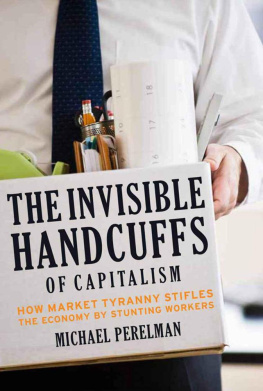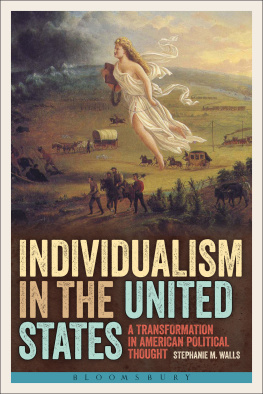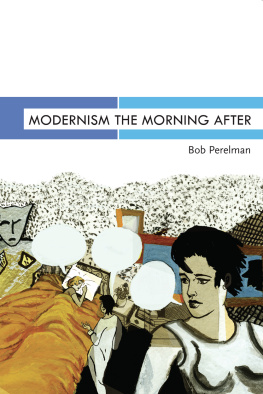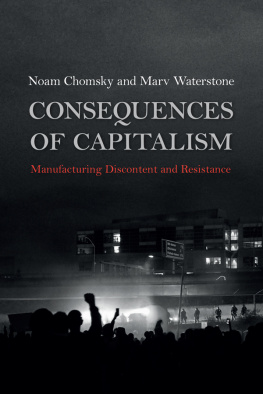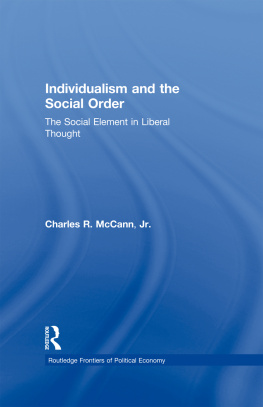Perelman - Manufacturing Discontent : The Trap of Individualism in Corporate Society (9781783718481)
Here you can read online Perelman - Manufacturing Discontent : The Trap of Individualism in Corporate Society (9781783718481) full text of the book (entire story) in english for free. Download pdf and epub, get meaning, cover and reviews about this ebook. publisher: Lightning Source Inc, genre: Politics. Description of the work, (preface) as well as reviews are available. Best literature library LitArk.com created for fans of good reading and offers a wide selection of genres:
Romance novel
Science fiction
Adventure
Detective
Science
History
Home and family
Prose
Art
Politics
Computer
Non-fiction
Religion
Business
Children
Humor
Choose a favorite category and find really read worthwhile books. Enjoy immersion in the world of imagination, feel the emotions of the characters or learn something new for yourself, make an fascinating discovery.

Manufacturing Discontent : The Trap of Individualism in Corporate Society (9781783718481): summary, description and annotation
We offer to read an annotation, description, summary or preface (depends on what the author of the book "Manufacturing Discontent : The Trap of Individualism in Corporate Society (9781783718481)" wrote himself). If you haven't found the necessary information about the book — write in the comments, we will try to find it.
Manufacturing Discontent : The Trap of Individualism in Corporate Society (9781783718481) — read online for free the complete book (whole text) full work
Below is the text of the book, divided by pages. System saving the place of the last page read, allows you to conveniently read the book "Manufacturing Discontent : The Trap of Individualism in Corporate Society (9781783718481)" online for free, without having to search again every time where you left off. Put a bookmark, and you can go to the page where you finished reading at any time.
Font size:
Interval:
Bookmark:
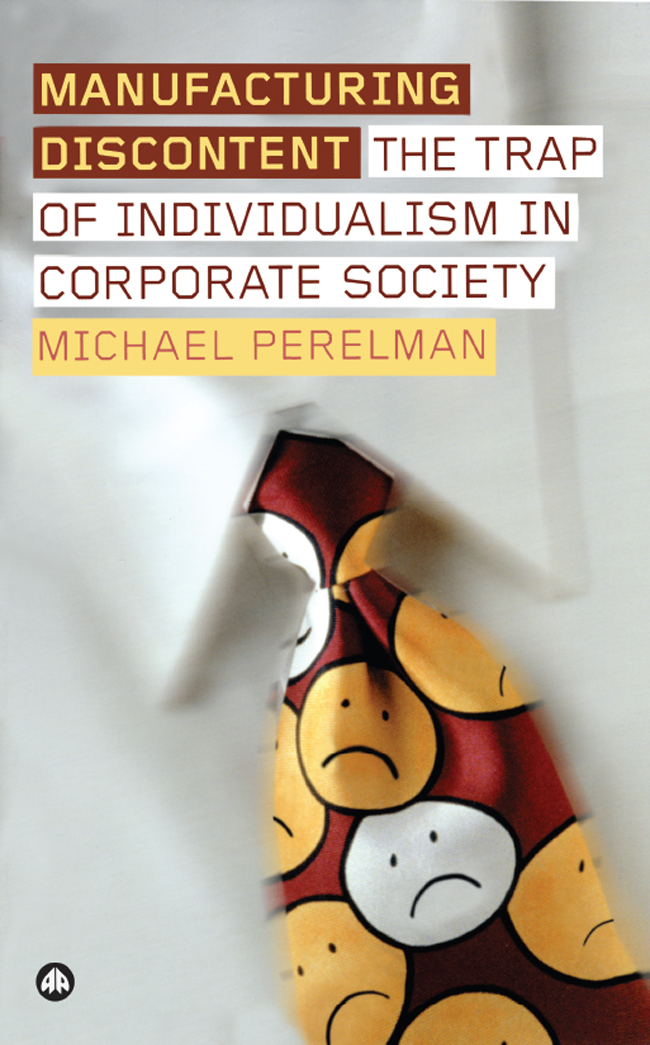
Manufacturing Discontent
Manufacturing
Discontent
The Trap of Individualism
in Corporate Society
Michael Perelman

First published in English 2005 by Pluto Press
345 Archway Road, London N6 5AA
and 839 Greene Street, Ann Arbor, MI 48106
www.plutobooks.com
Copyright Michael Perelman 2005
The right of Michael Perelman to be identified as the author of this work has been asserted by him in accordance with the Copyright, Designs and
Patents Act 1988.
British Library Cataloguing in Publication Data
A catalogue record for this book is available from the British Library
ISBN 978-0-7453-2406-7
ISBN 978-1-8496-4280-4
ISBN 978-1-7837-1849-8 Kindle
ISBN 978-1-7837-1848-1 ePub
Library of Congress Cataloging in Publication Data
Perelman, Michael.
Manufacturing discontent : the trap of individualism in corporate society / Michael Perelman.
p. cm.
ISBN 074532407X (hardback) ISBN 0745324061 (pbk.)
1. Social responsibility of businessUnited States. 2. CorporationsSocial aspectsUnited States. 3. IndividualismUnited States. 4. Consumption (Economics)United States. I. Title.
HD60.5.U5P39 2005
306.3'4dc22
2005001626
10 9 8 7 6 5 4 3 2 1
Designed and produced for Pluto Press by
Chase Publishing Services Ltd, Fortescue, Sidmouth, EX10 9QG, England
Typeset from disk by Stanford DTP Services, Northampton, England
Printed on demand in the European Union by CPI Antony Rowe, UK
Contents
Acknowledgments
I want to thank Wendy Diamond, Kuau Garrson, Bob Cottrell, Richard Ponorul, Aldo Matteucci, and especially Joanna Bujes for their excellent help. Most of all, I am indebted to Blanche Perelman, without whom this would not have been possible.
Introduction
IN THE BEGINNING
This book is about powerraw powerthe raw power of corporations alongside the powerlessness of individualism. Never before in the history of the world have corporate powers been as strong as they are today. Corporations brazenly are using their strength to accumulate even more power.
This corporate power is corrosive. Corporations continue to use their power in ways that harm people as consumers, workers, and citizens. I will describe a number of these threats to human and environmental health, education, and even democratic processes, as well as a host of other destructive consequences of corporate power, including the trampling of the individual rights that corporate society claims to hold dear. Corporate power makes idiots of us allin the original Greek sense the word, which referred to people concerned only with their own individual affairs and not those of the larger community.
The continuing growth of corporate power will be irreversible without concerted political activity. A political movement capable of standing up to corporate power will require that people shed those aspects of individualism that inhibit them from identifying as members of society rather than as isolated individuals.
This book describes how the distorted ideological perception of society within the United States has facilitated the construction of a corporate society in which corporate power grows at the expense of individual. The leaders of corporate society want us to see ourselves as a multitude of individuals satisfying our needs through the alchemy of the market, a market that we rule through the exercise of individual choice. The markets even-handed anarchy is supposed to be our modern wheel of fortune, impassively turning poor workers into kings.
This corporate society represents a twofold threat to the rest of the world. Most directly, the inordinate military power of the corporate-driven United States is capable of laying waste to any part of the world that it so chooses. More subtly, the institutional changes that have infected the United States are spreading throughout the worldpartly through the enormous political and military influence of the U.S. government, and partly through cultural sway. Mostly, however, competitive pressures have been responsible for this ongoing capitulation to the U.S. model.
For those of you outside of the United States, let this book serve as a warning: unless people around the world put up strong political resistance, what has happened in the United States is liable to repeat itself wherever you may be. Even ostensibly social democratic leaders are rapidly dismantling social democracies. Within this environment, pensions, labor market institutions, and environmental regulations all must give way to the logic of the corporate juggernaut. All the while, an evolving international trade regime is giving giant corporations virtually unrestricted freedom to roam the world unencumbered by national regulations. In considering the disaster presently befalling the United States, I am reminded of Karl Marxs citation of the Roman poet, Horace, in his introduction to Capital: De te fabula narratur! it is of you that the story is told.
This book leads to an unmistakable conclusion. Although individualism might seem to be antagonistic to corporate power, it actually reinforces corporate power. Only by joining together larger social groupssocial groups that can tap into the potential of their members individual strengthswill people be able to successfully challenge corporate power. I will explain why, if people allow themselves to become deluded in believing that their strength lies exclusively in their individuality, corporate power will almost inevitably increase relative to that of the rest of society. In short, individualism represents a dead end.
ATTACKING THE MYTH OF INDIVIDUALISM
The book begins by describing the myth of individualism and the power that this myth has over us. The first chapter offers a brief introduction to corporate society, emphasizing the many ways that corporate rights trump individual rights. This chapter describes how corporations cause problems that make corporate-friendly policies appear to be the only solution, leading to a never-ending spiral of corporate power.
It describes how conservative interests act to blunt the impact of growing protests against the primacy of business interests by actively promoting the false ideology of individualism, expressed by the myth of consumer sovereignty. As the pop artist Andy Warhol has said, Buying is much more American than thinking (Warhol 1975: 228).
According to this warped ideology, individuals are constituted by the choices they make as consumers. No matter that they toil away at mindless tasks day after day. No matter that they are turned into dispensable and interchangeable corporate pawns. When they come home, they can celebrate their freedom and unique identity by freely choosing whether to drink Coke or Pepsi.
This ideological vision of individualism is a warped individualism that allows individuals to make some limited choices, while many of the most important choices lie beyond them. When we come to believe this myth and to define our identity through shopping, not only have we lost the means by which we could act together to create our world, we no longer even see the need for such association. After all, the corporation is our friend and aims to satisfy our every need. In every sense, the myth of individualism is an absolute dead end.
looks at the negative social consequences of the framing of people as consumers. Consumerism, with its grotesque striving for excess, is antisocial from the start. The attempt of people to distinguish themselves through consumption is self-defeating for all concerned, except for the corporate interests. Besides profiting from consumer excesses, consumerism prevents the sort of social cohesion needed as a counterweight to corporate power.
Font size:
Interval:
Bookmark:
Similar books «Manufacturing Discontent : The Trap of Individualism in Corporate Society (9781783718481)»
Look at similar books to Manufacturing Discontent : The Trap of Individualism in Corporate Society (9781783718481). We have selected literature similar in name and meaning in the hope of providing readers with more options to find new, interesting, not yet read works.
Discussion, reviews of the book Manufacturing Discontent : The Trap of Individualism in Corporate Society (9781783718481) and just readers' own opinions. Leave your comments, write what you think about the work, its meaning or the main characters. Specify what exactly you liked and what you didn't like, and why you think so.


